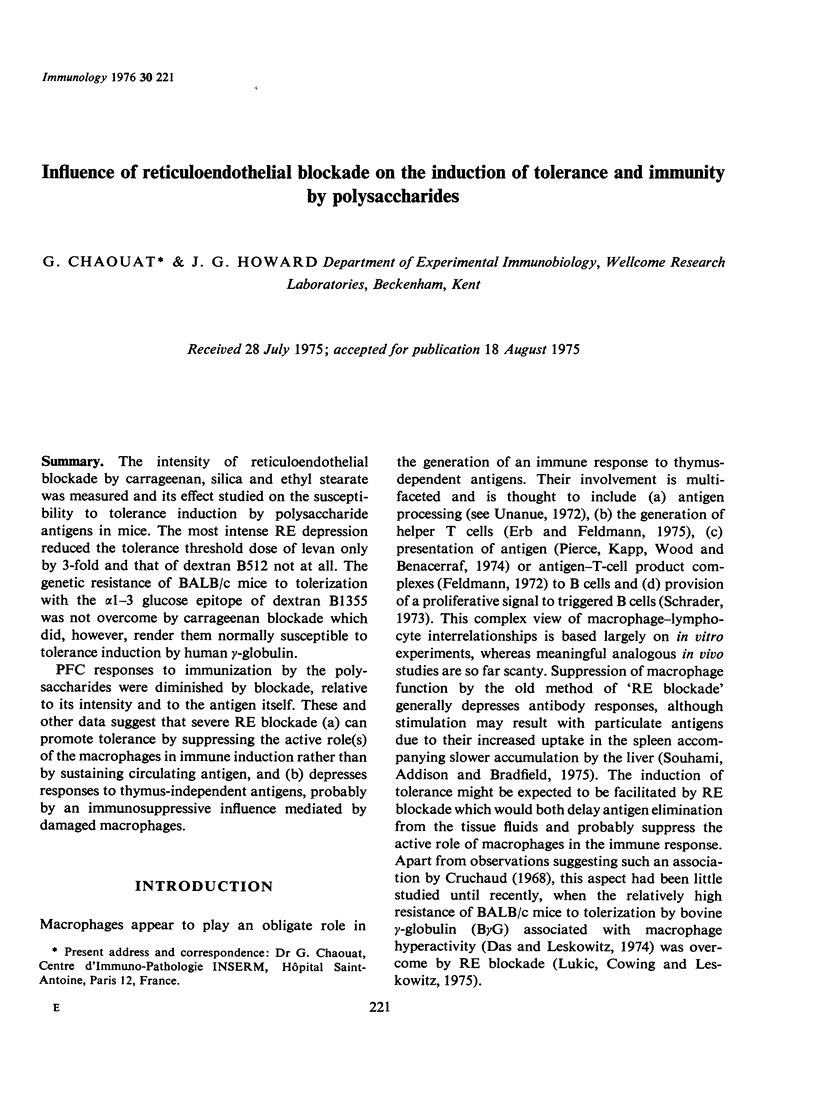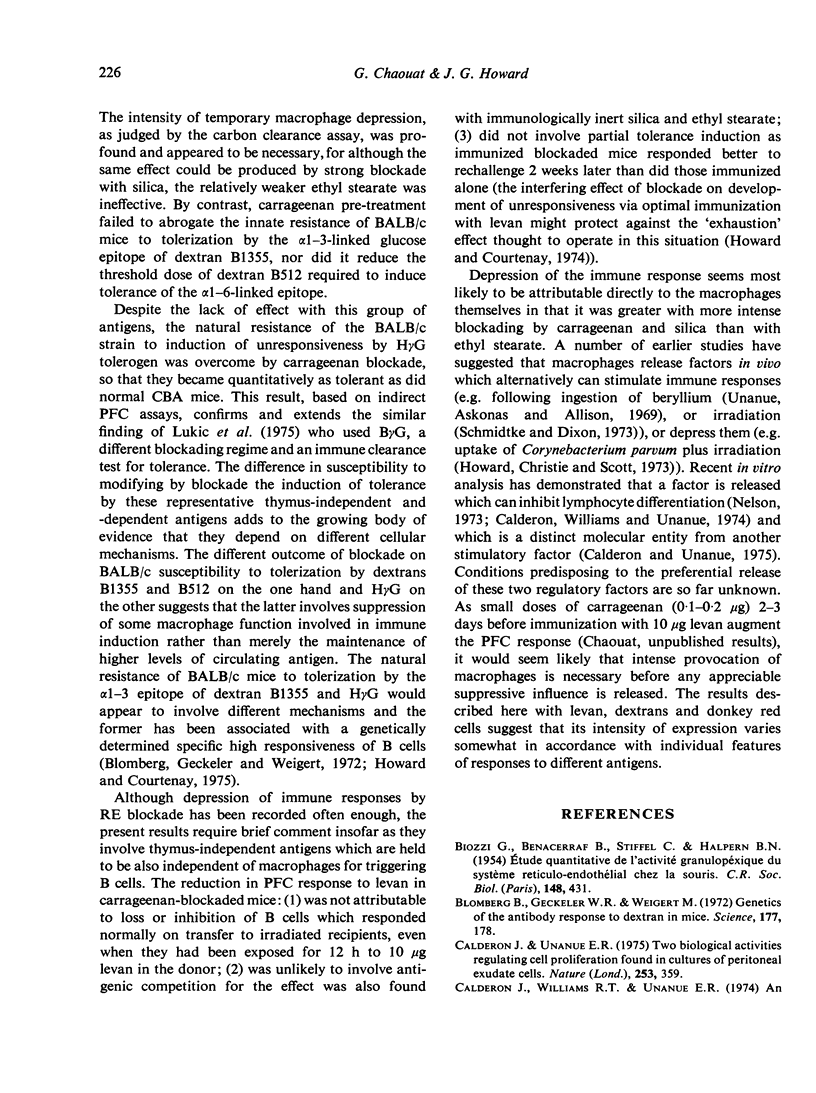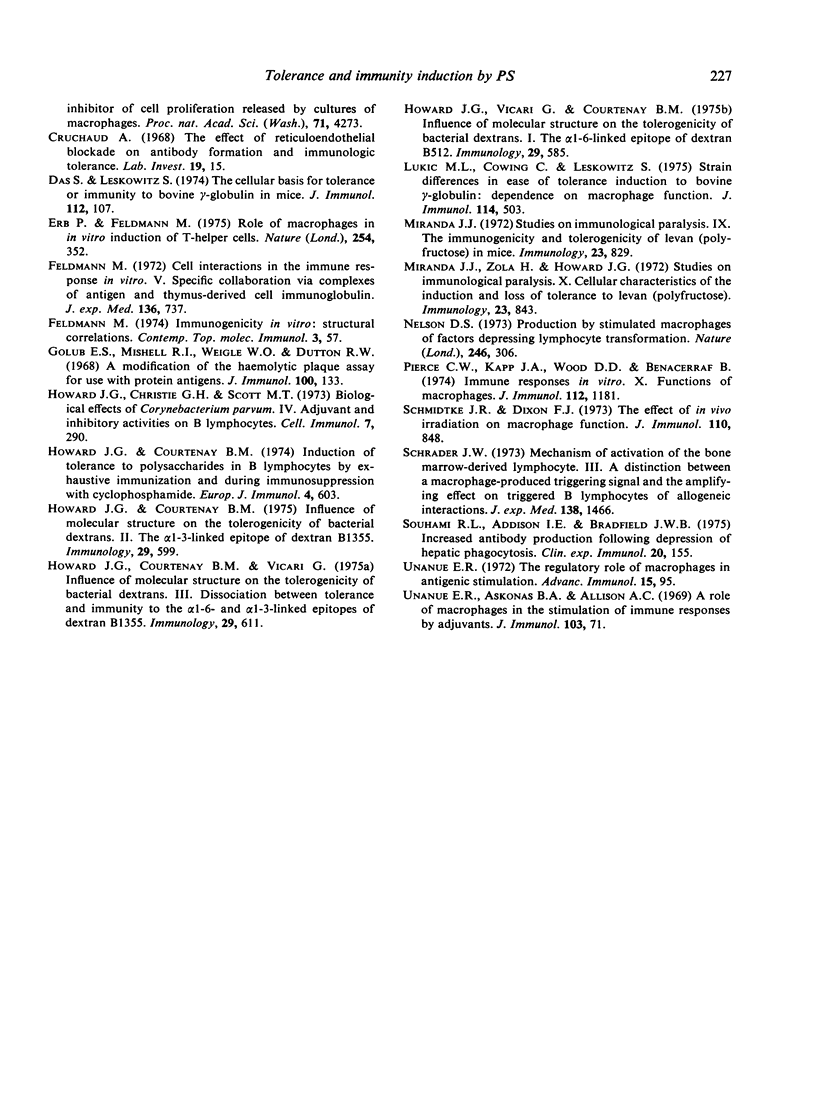Abstract
The intensity of reticuloendothelial blockade by carrageenan, silica and ethyl stearate was measured and its effect studied on the susceptibility to tolerance induction by polysaccharide antigens in mice. The most intense RE depression reduced the tolerance threshold dose of levan only by 3-fold and that of dextran B512 not at all. The genetic resistance of BALB/c mice to tolerization with the alpha1-3 glucose epitope of dextran B1355 was not overcome by carrageenan blockade which did however, render them normally susceptible to tolerance induction by human gamma-globulin. PFC responses to immunization by the polysaccharides were diminished by blockade, relative to its intensity and to the antigen itself. These and other data suggest that severe RE blockade (a) can promote tolerance by suppressing the active role(s) of the macrophages in immune induction rather than by sustaining circulating antigen, and (b) depresses responses to thymus-independent antigens, probably by an immunosuppressive influence mediated by damaged macrophages.
Full text
PDF






Selected References
These references are in PubMed. This may not be the complete list of references from this article.
- BIOZZI G., BENACERRAF B., STIFFEL C., HALPERN B. N. Etude quantitative de l'activité granulopexique du système réticuloendothéliai chez la souris. C R Seances Soc Biol Fil. 1954 Mar;148(5-6):431–435. [PubMed] [Google Scholar]
- Blomberg B., Geckeler W. R., Weigert M. Genetics of the antibody response to dextran in mice. Science. 1972 Jul 14;177(4044):178–180. doi: 10.1126/science.177.4044.178. [DOI] [PubMed] [Google Scholar]
- Calderon J., Unanue E. R. Two biological activities regulating cell proliferation found in cultures of peritoneal exudate cells. Nature. 1975 Jan 31;253(5490):359–361. doi: 10.1038/253359a0. [DOI] [PubMed] [Google Scholar]
- Cruchaud A. The effect of reticuloendothelial blockade on antibody formation and immunologic tolerance. Lab Invest. 1968 Jul;19(1):15–24. [PubMed] [Google Scholar]
- Das S., Leskowitz S. The cellular basis for tolerance or immunity to bovine-gamma-globulin in mice. J Immunol. 1974 Jan;112(1):107–114. [PubMed] [Google Scholar]
- Erb P., Feldmann M. Role of macrophages in in vitro induction of T-helper cells. Nature. 1975 Mar 27;254(5498):352–354. doi: 10.1038/254352a0. [DOI] [PubMed] [Google Scholar]
- Feldmann M. Cell interactions in the immune response in vitro. V. Specific collaboration via complexes of antigen and thymus-derived cell immunoglobulin. J Exp Med. 1972 Oct 1;136(4):737–760. doi: 10.1084/jem.136.4.737. [DOI] [PMC free article] [PubMed] [Google Scholar]
- Golub E. S., Mishell R. I., Weigle W. O., Dutton R. W. A modification of the hemolytic plaque assay for use with protein antigens. J Immunol. 1968 Jan;100(1):133–137. [PubMed] [Google Scholar]
- Howard J. G., Christie G. H., Scott M. T. Biological effects of Corynebacterium parvum. IV. Adjuvant and inhibitory activities on B lymphocytes. Cell Immunol. 1973 May;7(2):290–301. doi: 10.1016/0008-8749(73)90251-7. [DOI] [PubMed] [Google Scholar]
- Howard J. G., Courtenay B. M. Induction of B cell tolerance to polysaccharides by exhaustive immunization and during immunosuppression with cyclophosphamide. Eur J Immunol. 1974 Sep;4(9):603–608. doi: 10.1002/eji.1830040905. [DOI] [PubMed] [Google Scholar]
- Howard J. G., Courtenay B. M. Influence of molecular structure on the tolerogenicity of bacterial dextrans. II. The alpha1--3-linked epitope of dextran B1355. Immunology. 1975 Oct;29(4):599–610. [PMC free article] [PubMed] [Google Scholar]
- Howard J. G., Courtenay B. M., Vicari G. Influence of molecular structure of the tolerogenicity of bacterial dextrans. III. Dissociation between tolerance and immunity to the alpha1--6- and alpha1--3-linked epitopes of dextran B1355. Immunology. 1975 Oct;29(4):611–619. [PMC free article] [PubMed] [Google Scholar]
- Howard J. G., Vicari G., Courtenay B. M. Influence of molecular structure on the tolerogenicity of bacterial dextrans. I. The alpha1--6-linked epitope of dextran B512. Immunology. 1975 Oct;29(4):585–597. [PMC free article] [PubMed] [Google Scholar]
- Lukić M. L., Cowing C., Leskowitz S. Strain differences in ease of tolerance induction to bovine gamma-globulin: dependence on macrophage function. J Immunol. 1975 Jan;114(1 Pt 2):503–506. [PubMed] [Google Scholar]
- Miranda J. J. Studies on immunological paralysis. IX. The immunogenicity and tolerogenicity of levan (polyfructose) in mice. Immunology. 1972 Dec;23(6):829–842. [PMC free article] [PubMed] [Google Scholar]
- Miranda J. J., Zola H., Howard J. G. Studies on immunological paralysis. X. Cellular characteristics of the induction and loss of tolerance to levan (Polyfructose). Immunology. 1972 Dec;23(6):843–855. [PMC free article] [PubMed] [Google Scholar]
- Nelson D. S. Production by stimulated macrophages of factors depressing lymphocyte transformation. Nature. 1973 Nov 30;246(5431):306–307. doi: 10.1038/246306a0. [DOI] [PubMed] [Google Scholar]
- Pierce C. W., Kapp J. A., Wood D. D., Benacerraf B. Immune responses in vitro. X. Functions of macrophages. J Immunol. 1974 Mar;112(3):1181–1189. [PubMed] [Google Scholar]
- Schmidtke J. R., Dixon F. J. The effect of in vivo irradiation on macrophage function. J Immunol. 1973 Mar;110(3):848–854. [PubMed] [Google Scholar]
- Schrader J. W. Mechanism of activation of the bone marrow-derived lymphocyte. 3. A distinction between a macrophage-produced triggering signal and the amplifying effect on triggered B lymphocytes of allogeneic interactions. J Exp Med. 1973 Dec 1;138(6):1466–1480. doi: 10.1084/jem.138.6.1466. [DOI] [PMC free article] [PubMed] [Google Scholar]
- Souhami R. L., Addison I. E., Bradfield J. W. Increased antibody production following depression of hepatic phagocytosis. Clin Exp Immunol. 1975 Apr;20(1):155–159. [PMC free article] [PubMed] [Google Scholar]
- Unanue E. R., Askonas B. A., Allison A. C. A role of macrophages in the stimulation of immune responses by adjuvants. J Immunol. 1969 Jul;103(1):71–78. [PubMed] [Google Scholar]
- Unanue E. R. The regulatory role of macrophages in antigenic stimulation. Adv Immunol. 1972;15:95–165. doi: 10.1016/s0065-2776(08)60684-7. [DOI] [PubMed] [Google Scholar]


